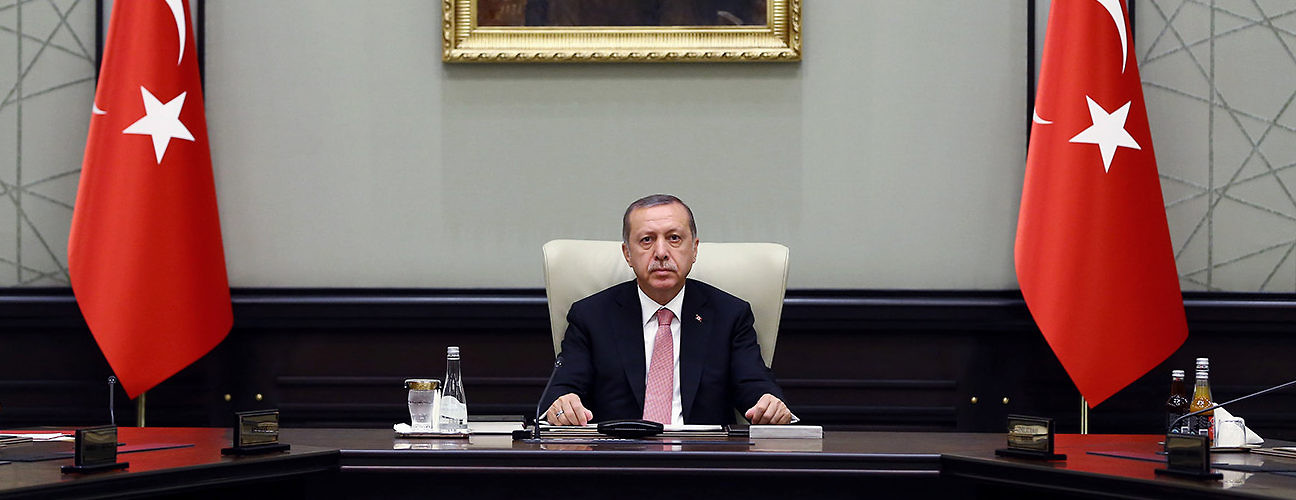President Recep Tayyip Erdogan heads an emergency meeting of the National Security Council following the July 15 coup attempt. Ankara, Turkey, July 20, 2016 (Kayhan Ozer/Pool/Associated Press)
In the wake of the attempted coup that began in Turkey on the evening of July 15 and was quickly thwarted, it was unsurprising that the government of President Recep Tayyip Erdoğan started to crack down on those who plotted to unseat it. The increasingly authoritarian initiatives to reduce the independence of the judiciary, restrict media freedoms, and punish expressions of dissent by citizens and foreigners alike provided ample indication that Erdoğan will not brook opposition.
Further, the initiative to remove the governing Justice and Development Party (AKP) from power was not a bloodless one, as were Turkey’s four previous coups in 1960, 1971, 1980, and 1997 (if not the days that followed). Nearly 300 people were killed and thousands injured, civilians bulldozed by military tanks in the middle of the street, and government officials targeted with bullets to the head. A resounding response might thus be expected from any government. Nonetheless, the pace and severity has still taken most observers by surprise, and all are struggling to follow the rapidly unfolding events. Yesterday, Erdoğan declared a state of emergency for Turkey, allowing his government and local officials to use measures such as restricting travel, seizing materials, banning public assembly, and to rule by decree. Quickly following this announcement, Turkey suspended the European Convention on Human Rights, freeing the government from its obligations.
Even before these extraordinary measures were taken, massive waves of arrests, suspensions, and detentions demonstrated Erdoğan’s resolve to make coup plotters “pay the heavy price of treason to the homeland.” Those affected included not only members of the military and the judiciary, but also thousands of civil servants. All university deans—public and private—were instructed to resign from their positions on Tuesday, and Wednesday brought a travel ban for university faculty in Turkey conducting research abroad.
The swiftness and width of these purges led some to suspect—unsurprisingly given that conspiracy theorizing is rampant in Turkey—that the mismanaged and summarily squashed coup attempt was staged to provide a pretext for the further consolidation of the Turkish president’s power. Fethullah Gülen, the United States-exiled Islamic cleric and former AKP ally, for example, was quick to make this claim. This comes as no shock either, as Erdoğan was even quicker to put the blame squarely on Gülen. The president has had a personal vendetta against the cleric ever since the latter’s Turkey-based followers opened corruption investigations for members of Erdoğan’s family and cabinet.
The aftermath of the coup demonstrates a rift much wider than that between supporters of Gülen and Erdoğan, however. The vocalization of sentiments such as “hell for secularists,” chanted among pro-government supporters during a rally in Adana on Tuesday, indicate a boiling over of long-simmering tensions between secular and pious Turks. Experts quote senior AKP officials as saying they want to “destroy secularists.” Secular Turks, in turn, have expressed immense discomfort and concern about not only the actions of the AKP—a party rooted in a traditionally anti-Western strand of political Islam—but how their AKP-supporting neighbors and co-workers will behave toward them.
Scholars including the University of London’s Deniz Kandiyoti rightly note that Islamist-secularist dichotomies often cited in Turkey—similar to those drawn between Turks and Kurds, Alevis and Sunnis, traditional and modern—greatly oversimplify things, and that the post-1980 military government utilized Islam to try to create social cohesion out of the deadly chaos that prompted that era’s coup. Others such as Portland State University’s Birol Yeşilada have repeatedly demonstrated that political Islam is a powerful motivating force against secularism that resonates with many Turks. A tweet posted Saturday from the formerly staunchly secularist institution of the Turkish presidency, for example, proclaimed that “the Muslim faithful (müminler) who stood up straight [against coup-makers] only bend in the presence of Allah.” This tweet, somewhat ironically coming from the office of the man who once declared Twitter to be a menace to society, performed a double duty: condemning the secularist officers and “unfaithful” Gülen supporters orchestrating the coup, and praising the true believers for their vigilance. The invocation of Islam to spur a wave of counter-coup mobilization thus got the job done, but leaves roiling societal tensions in its wake.
Speaking via FaceTime (again ironic for someone who has denounced the use of the internet) on a live news broadcast from an undisclosed location during the coup attempt, Erdoğan urged his supporters to defy the curfew declared by the military and take to the streets to “give [the traitors] their answer.” Shortly after, on orders from Turkey’s Directorate of Religious Affairs, calls issued from mosques’ speaker systems instructed listeners to take responsibility for the protection of their homeland “for the love of Allah and Muhammad.” Heeding the call, crowds marching to Kızılay Square in Ankara shouted slogans supporting the introduction of sharia law and chanted “we want the death penalty” for the perpetrators of the coup. A similar slogan (#Idamistiyorum) reportedly became the top trending hashtag on Twitter earlier that day.
Calls for vengeance with references to Islam by leaders and members of society alike are concerning for the future peace and security of Turkey. Language invoking Islam to attack opponents may be considered useful for the short-term political gain of these groups, but it is also likely to galvanize those on the street to seek retribution. Erdoğan initially declared the coup a “gift from God,” likely seeing the current situation as a national security crisis that justifies pushing forward with his vision for a “new Turkey,” i.e. one with a highly consolidated presidential system that he rules from the top. What first appears to be an opportune initiative to further tighten his institutional grip, however, threatens to further widen Turkey’s societal rifts.
Dr. Lisel Hintz is a Postdoctoral Fellow at the Mario Einaudi Center for International Studies, Cornell University.





